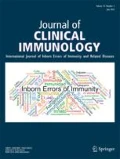Abstract
We examined the effect of temperature on the measurement of enzyme-linked immunosorbent assay (ELISA)-defined human polyclonal antiphospholipid antibody. Both IgG and IgM antibodies were easily demonstrable when sera were incubated on phospholipid-coated ELISA plates at 4–22° C. When incubations were done at 37–45° C IgG antibody binding markedly decreased but IgM antibody binding did not. Warming the phospholipid-coated ELISA plate alone, the serum alone, the buffer alone, or the blocking reagent alone had no effect. When the antigen content of the wells was increased fourfold the effect of warming still occurred. The effect of warmth was reversible and was seen with affinity-purified antibody as well as with whole serum. Phospholipid vesicles in suspension, however, absorbed antibody in a dose-dependent fashion at 4, 22, and 42° C. These results indicate that antibody binding to phospholipid is temperature dependent when phospholipid is adherent to the solid phase. Whether the change in IgG-phospholipid interaction results from a change in antigen or in antibody remains unknown.
Similar content being viewed by others
References
Harris EN, Gharavi AE, Hughes GRV: Anti-phospholipid antibodies. Clin Rheum Dis 11:591–609, 1985
Lockshin MD, Druzin ML, Goei S, Qamar T, Jovanovic L, Magid M, Ferenc M: Antibodies to cardiolipin as a predictor of fetal distress or death in pregnant patients with SLE. N Engl J Med 313:152–156, 1985
Harris EN, Gharavi AE, Patel SP, Hughes GRV: Evaluation of the anticardiolipin antibody test: Report of an international workshop held 4 April 1986. Clin Exp Immunol 68:215–222, 1987
Rauch J, Tannenbaum M, Tannenbaum H, Ramelson H, Cullis PR, Tilcock CPS, Hope MJ, Janoff AS: Human hybridoma lupus anticoagulants distinguish between lamellar and hexagonal phase lipid systems. J Biol Chem 261:9672–9677, 1986
Croxton FE: Elementary Statistics, with Applications in Medicine and the Biological Sciences. New York, Dover, 1959, p 240
Wilkinson HW: Immunodiagnostic tests for Lyme disease. Yale J Biol Med 57:567–572, 1974
Janoff AS, Rauch J: The structural specificity of anti-phospholipid antibodies in autoimmune disease. Chem Phys Lipids 40:315–332, 1986
Stollar BD, Sandberg AL: Comparisons of antibodies reacting with DNA. I. Systemic lupus erythematosus sera and rabbit antibodies induced by DNA-methylated bovine serum albumin complexes. J Immunol 96:755–763, 1966
Sandberg AL, Stollar BD: Comparisons of antibodies reacting with DNA. II. Rabbit antibodies induced by nucleoside-protein conjugates. J Immunol 96:764–771, 1966
Author information
Authors and Affiliations
Rights and permissions
About this article
Cite this article
Lockshin, M.D., Qamar, T., Levy, R.A. et al. IgG but not IgM anti-phospholipid antibody binding is temperature dependent. J Clin Immunol 8, 188–192 (1988). https://doi.org/10.1007/BF00917565
Accepted:
Issue Date:
DOI: https://doi.org/10.1007/BF00917565




